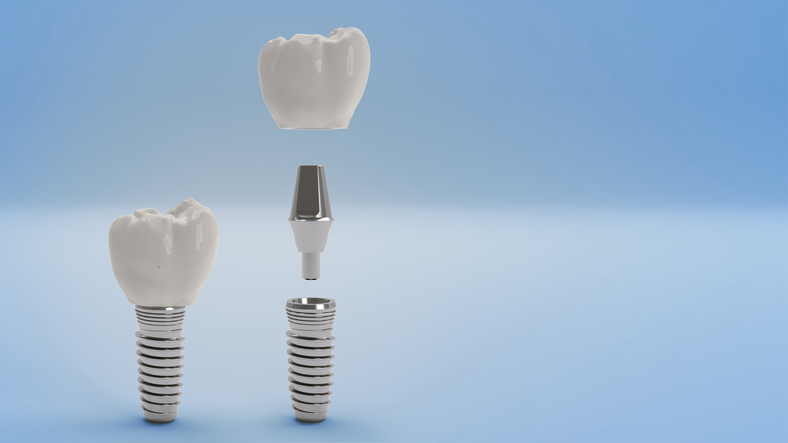
Ease your worries by learning what to expect following your dental implant surgery.
Compared to dentures, dental implants offer a more permanent solution to missing teeth. Yet the dental implant process involves major oral surgery. Your dental implant recovery will take months from the initial surgery to the placement of the crown. But in the end, your strong, natural-looking teeth will be worth the wait.
How quickly you heal from dental implant surgery depends on your general health. Will you need a bone graft? How many teeth need to be replaced? Where is the location of the implants? The answers to these questions all can affect recovery time. If you are in good health and have no serious oral issues, you can expect a normal recovery from dental implant surgery. Even so, knowing what to expect after surgery can ease your worries and help you achieve a full recovery.
What to expect during and after dental implant surgery
The dental implant procedure begins when the dentist makes a small incision and drills into the jawbone. A titanium rod is then inserted into the bone. Because bone has no nerve endings, this stage will produce little to no pain.
The rod must fuse to the bone in a process called osseointegration, which typically takes over the course of three to six months. During this time, your dentist will place a temporary crown or dentures so you won’t have any gaps.
Once the rod and bone have bonded, an abutment will be attached to the rod via a minor surgical procedure. The final phase occurs four to six months after the initial surgery when an artificial tooth is screwed onto the abutment.
Local anesthesia will make the surgery more comfortable, and any stitches will dissolve within days. After the surgery, you may experience slight pain, swelling, and minor bleeding for a few days. If you have severe bleeding, pain that lasts for more than a week, or any signs of an infection, tell your dentist immediately. Dental implant surgery has a high success rate, so complications are rare.
Six tips for a full recovery from dental implant surgery
Most dental implant patients experience a smooth recovery with few complications. What you do immediately after the surgery will help the healing process. Here are six after-surgery care tips:
Rest. Your body needs rest to heal, so take the day off after the surgery. Since you’re recovering from anesthesia, don’t drive for a few days. Avoid strenuous activities or any sport where your face could be hit.
Rinse with warm water. Brushing your teeth following surgery is not advisable. Instead, rinse with a solution of warm water and salt to clear away bacteria without irritating the incision.
Apply ice. Apply an ice pack to your cheek for 20 minutes to reduce minor swelling.
Take medication for pain. Your dentist may prescribe pain medication after surgery. Or, you can take over-the-counter pain reducers such as acetaminophen (Tylenol).
Eat soft foods. Plan on a soft-food diet for between one week to 30 days after surgery. Smoothies, yogurt, applesauce, and protein shakes provide nutrition while not inflaming the surgery site. Hot and cold temperatures can be irritating, so if you eat a creamy soup, heat it to a lukewarm temperature. Vegetables are fine as long as they are cooked to a soft consistency.
Stop smoking & limit alcohol. Nicotine blocks oxygen flow to your bones and tissues, and that will prolong your recovery. Stop smoking for at least one week before and after surgery — or better yet, quit altogether. Alcohol also interferes with the healing process.
Are implants right for you?
Schedule an appointment at Espire’s Colorado Springs location today! Our highly trained dentists will examine your teeth and explain how dental implants can help you. Don’t live near our Colorado Springs office? Find one of our other locations near you.
Colorado Springs
8610 Explorer Drive #315
Colorado Springs, CO 80920

